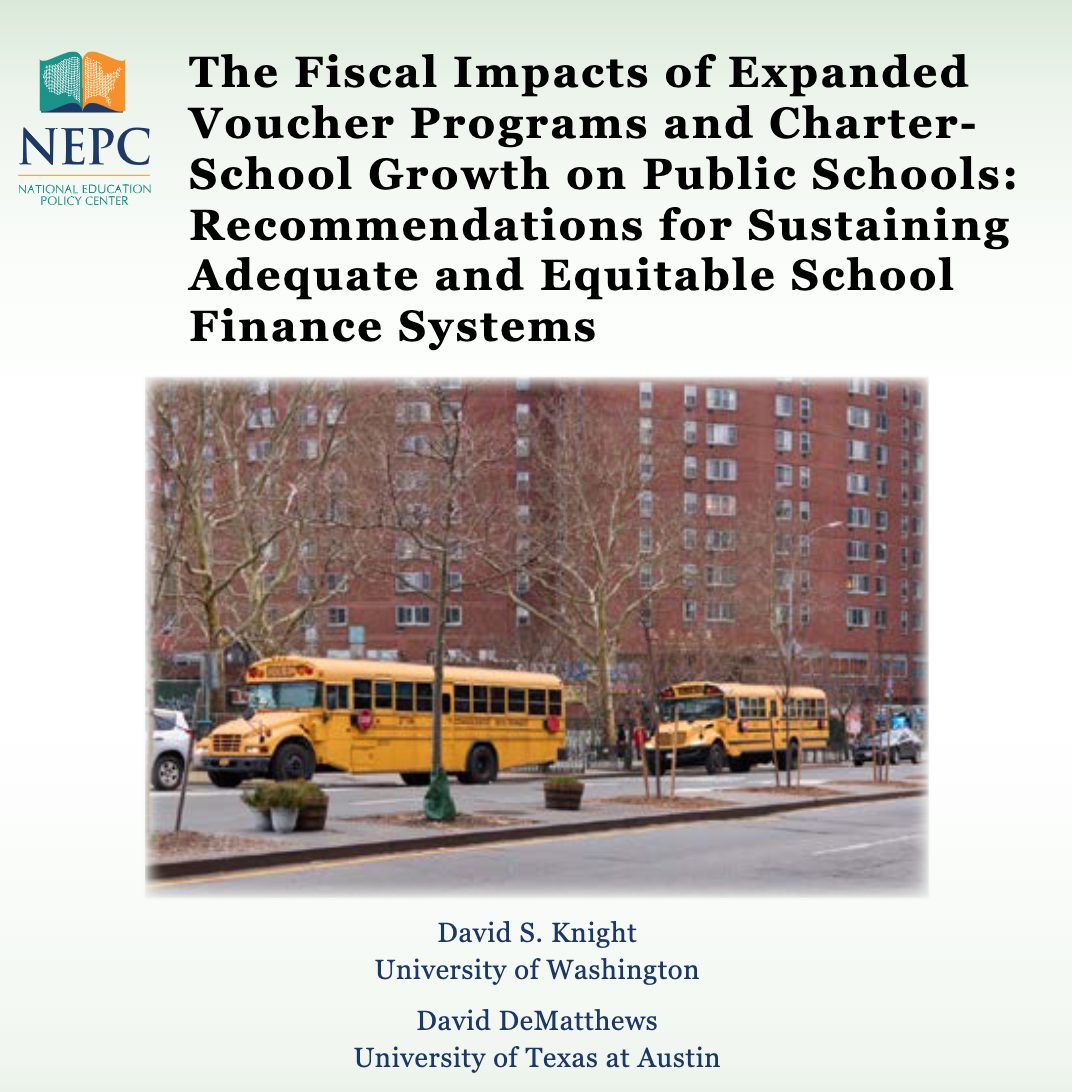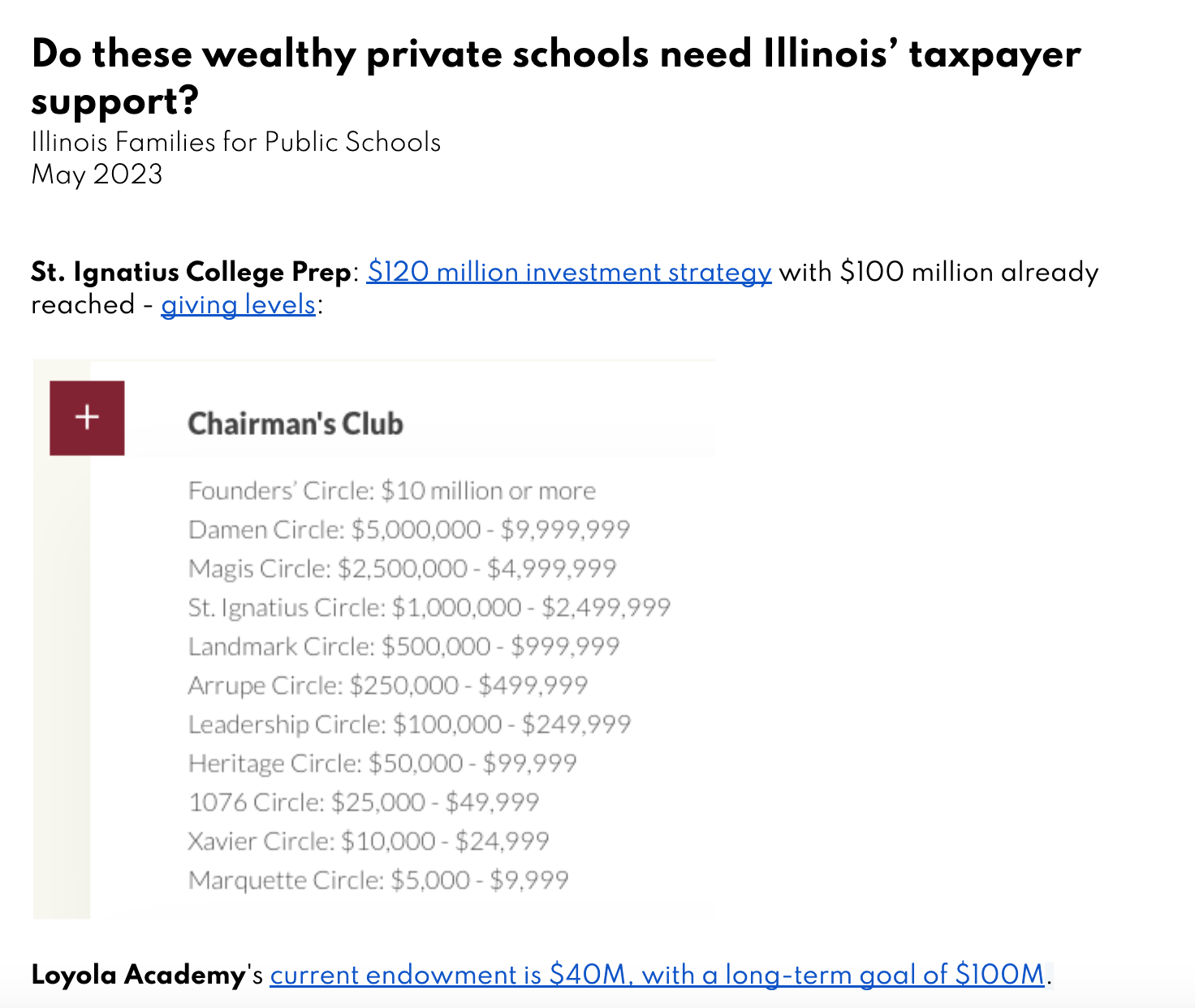ALL RESOURCES
FILTER BY TAG
Select a tag
- Academic performance
- Accessibility
- Accountability
- Advocacy
- Advocates
- Article
- Bill analysis
- Bill tracker
- Billionaires
- Blog post
- Civil rights
- Coalition building
- Community Schools
- Cost impact analysis
- Dark Money
- Data
- Disability
- Discrimination
- Drain funds from public education
- Education Savings Account (ESA)
- English language learners
- Fact sheet
- Fraud Waste and Abuse
- Graphic
- History
- Indigenous and Native Education
- Integration
- LGBTQ+
- Legislation
- Letter
- Litigation
- Messaging or talking points
- Model legislation
- National Voucher
- News
- Parents
- Personal narrative
- Podcast
- Policy brief
- Policymakers
- Radio
- Referendum
- Religion
- Report
- Rural communities
- Segregation
- Separation of church and state
- Slide deck
- Slides
- State Constitutional Right to Education
FILTER BY AUTHOR
Select an author
- Aaron Sanderford
- Alec MacGillis
- Allen Pratt
- Associated Press
- Bob Peterson
- Bruce Schreiner
- Catherine Caruso
- David Montgomery
- David Pepper
- Eli Hager
- Emily Walkenhorst
- Ethan Dewitt
- Geoff Mulvihill
- Hilary Wething
- Howard Fischer
- Jason Bailey
- Jessica Corbett
- Jim Collier
- Joe Dana
- Joshua Cowen
- Juan Perez Jr.
- Kiera Butler
- Laura Pappano
- Liam Amick
- Maurice Cunnningham
- Nora De La Cour
- Paige Masten
- Patrick Darrington
- Paul Hammel
- Phil Williams
- Rob Boston
- Robert Huber
- Rowan Moore Geretsy
- Sasha Pudelski

Directional Signals: A New Analysis of the Evolving Private School Choice Landscape
Three years ago, Arizona became the first state to allow all students—regardless of income or need—to use public dollars for private school tuition and other educational expenses. The move marked a sweeping shift in the scale and scope of school choice in the United States.

Voucher Take-up Rates
This document lists articles from different states on the percentages of voucher students who never attended public school or were already in private school.

Most new voucher recipients didn't come from an NC public school, new data shows
Most of North Carolina's publicly funded general private school tuition vouchers this year went to students who were not enrolled in a North Carolina public school the year before, a new state report shows.
The North Carolina Department of Public Instruction found 6,710 recipients of the voucher, called an Opportunity Scholarship, this year attended a public school in the state last year.

The five-alarm fire that public education is facing
All children deserve to attend welcoming and well-funded schools where they can learn and grow, regardless of race, disability, or income. But funding for public schools, where nearly 90% of all U.S. students learn, is at a near crisis point. The Trump administration’s goals, which are taken right out of Project 2025, seem to be to defund public education to the point that it doesn’t work, then offer private school vouchers as a solution to a manufactured problem. In this post, we highlight five ways public education is on fire in the United States and the damage this will do to students’ abilities to learn and thrive. Instead of cutting funds, lawmakers should invest in public schools, one of the best tools we still have to build a prosperous, equitable country.

About That Urban Institute Voucher Study: Q&A With Josh Cowen
The Urban Institute released a report on April 22nd that has been gaining excessive attention among advocates of private-school vouchers. In the Q&A below, National Education Policy Center director Kevin Welner asks Josh Cowen of Michigan State University to help us un- derstand that study and why there has been so much interest among folks who have other- wise been shielding their eyes from recent voucher research. Prof. Cowen was lead author of a similar study published in 2013, so we thought he would be the ideal person to comment on this new one. Cowen is the author of the 2024 book, The Privateers: How Billionaires Created a Culture War and Sold School Vouchers (Harvard Education Press).

The Fiscal Impacts of Expanded Voucher Programs and Charter-School Growth on Public Schools: Recommendations for Sustaining Adequate and Equitable School Finance Systems
The U.S. Department of Education has projected enrollment declines over the next decade, leading to budget cuts for school districts, which will be particularly impactful in urban and rural areas serving vulnerable students. As federal COVID-19 funds expire, districts will face challenges in cutting costs, potentially leading to layoffs or school closures. Meanwhile, many states have expanded voucher programs and charter schools, diverting funds from public schools despite limited enrollment growth. Research shows these shifts harm traditional public school financing. To address this, policymakers must ensure equitable funding for public schools and hold charter and private schools to the same standards as public ones.

How vouchers harm public schools
The growing popularity of vouchers raises a host of crucial questions and concerns. Key to informing the debate are questions of public finance and education quality. Is allowing public money to leave the public school system and follow kids to private schools the most effective or equitable way to make sure every child has access to an excellent education? Our view is that it’s not. Public dollars allocated to education should go to boosting spending in public systems, not subsidizing private education.

Florida Private Education Vouchers Cost $4 Billion This School Year
Florida is already deeply underfunding its public schools. The state sits at the bottom of the national school funding rankings in ELC’s Making the Grade 2024 report, scoring grades of ‘F’ for funding level, for inequitable distribution of that funding, and for funding effort. As funding for private education vouchers has increased, it is consuming an ever larger portion of overall taxpayer funds directed to education, increasing from 12% of public funds spent on education in 2021-22 to 23% this year.

The Impact of Diverting Public Money to Private School Vouchers in Kentucky
The Kentucky General Assembly enacted a private school voucher program in 2021 and legislation was filed to expand the program before the state Supreme Court struck it down for violating Kentucky’s constitution. That decision led directly to the legislature putting Amendment 2 on the ballot. Similar states that lack Kentucky’s constitutional protections for public education have recently increased spending on vouchers and school privatization at a rapidly growing cost to their budgets. Given that history and context, it is plausible to assume the legislature will pursue a similar path if voters approve the amendment.

Be wary of what you read in the school voucher debate
The information surrounding universal voucher programs is rife with advocacy masquerading as research.

Arizona’s ‘universal’ education savings account program has become a handout to the wealthy
Amid a wave of legislation that created or expanded private-school choice programs across the country, Robert Enlow, the President/CEO of EdChoice, dubbed 2023 as “the year of universal choice.” Enlow wasn’t wrong. Universal eligibility is the defining trend in recent private school choice reforms. For decades, private-school choice programs (like vouchers) provided funds only to certain families—e.g., families with low household income or a child with a disability. Recently, however, Republican lawmakers have created or expanded private-school choice programs to allow nearly all students, regardless of their individual need, access to public funding to attend private schools.

Decoupling Property and Education
The first step in stopping the privatization movement is to understand it. This report takes up where our 2018 report left off. Not only do we grade the states based on their willingness to commit exclusively or primarily to democratically governed public schools open to all, but their willingness to put sufficient guardrails and limits on publicly-funded alternatives to ensure that taxpayers, students, and families are protected from discrimination, corruption and fraud in the programs they have.

Public Schooling in America: Measuring Each State's Commitment to Democratically Governed Schools.
The first step in stopping the privatization movement is to understand it. This report takes up where our 2018 report left off. Not only do we grade the states based on their willingness to commit exclusively or primarily to democratically governed public schools open to all, but their willingness to put sufficient guardrails and limits on publicly-funded alternatives to ensure that taxpayers, students, and families are protected from discrimination, corruption and fraud in the programs they have.

Stop Vouchers Webpage
Texas Governor Abbott called a special legislative session in October 2023 to press legislators to establish Texas’ first-ever private school voucher program, funded by all Texas taxpayers. Instead, Texas needs to invest in public schools that serve 5.4 million students and their families. The proposed voucher program would cost $500 million. Get resources here to help Texas say no to vouchers!

Do these wealthy private schools need Illinois’ taxpayer support?
Illinois Families for Public Schools developed a fact sheet with information and resources about the funding behind wealthy private schools.

New analysis shows many private schools in N.C. have more vouchers than students
This session, General Assembly leaders have placed a massive expansion of the state’s voucher program at the top of their education agenda. Legislative leaders in both the House and the Senate want to triple the program’s size by opening it to wealthy families who have already enrolled their children in private schools. But new data shows that the existing program lacks adequate oversight and is potentially riven with fraud.
Data from the two agencies charged with overseeing private schools and North Carolina’s Opportunity Scholarship voucher program show several cases where schools have received more vouchers than they have students. Several other private schools have received voucher payments from the state after they have ceased submitting enrollment data.

NEPC Review: The Ohio EdChoice Program’s Impact on School District Enrollments, Finances, and Academics
A recent report from the Thomas Fordham Institute, The Ohio EdChoice Program’s Impact on School District Enrollments, Finances, and Academics, considers three possible harms associated with Ohio’s voucher program: to public school student outcomes through com- petition, to district financial resources, and increased racial segregation. Finding that Ohio vouchers have had few such harmful impacts, the report concludes that it has effectively dismissed the primary concerns of voucher critics. Yet, while the report is broadly methodologically sound for the narrow questions it poses, the questions it asks are out-of-date with respect to current concerns raised by voucher critics, which focus on substantially decreased student achievement among students using vouchers.

Vouchers and Public Benefits in the Budget
These slides from Policy Matters Ohio show how the Ohio budget funds school voucher programs compared to other public benefit programs.

State of Ohio Schools 2023
Ohio's students deserve a world-class education, including safe and well-resourced schools that are staffed with teachers who are well trained and fairly paid. Providing that education is our shared responsibility, and we all share its benefits as well: Every family does better when the next generation is prepared for the future, every community is enhanced when its young people are engaged, curious and active participants, and every boss wants a highly qualified hiring pool.
However, the combined effects of the COVID pandemic and Ohio’s legacy of inadequate, inequitable funding have weakened the role school plays as a foundational public institution. Ohio ranks 21st in the nation for K-12 education, 46th for equitable distribution of funding, and 40th in starting teacher salaries. Ohio public schools educate 1.7 million students across racial, gender, socioeconomic and geographic lines — and every one of them deserves better.

Funding Ohio’s Future
School is a place where childhood happens. Ohio’s public educators teach children of all races and backgrounds basic skills, but also challenge and inspire them to follow their dreams. For many students, school is a safe place to learn, develop and grow.
Ohio currently educates 1.6 million children attending school in our cities, suburbs and small towns. For years, almost no one was happy about how the state of Ohio funded public schools. The system pitted communities against each other and private and charter schools against public schools. We were living in the K-12 version of the “Hunger Games”: The wealthier your district, the stronger your chances of success.
